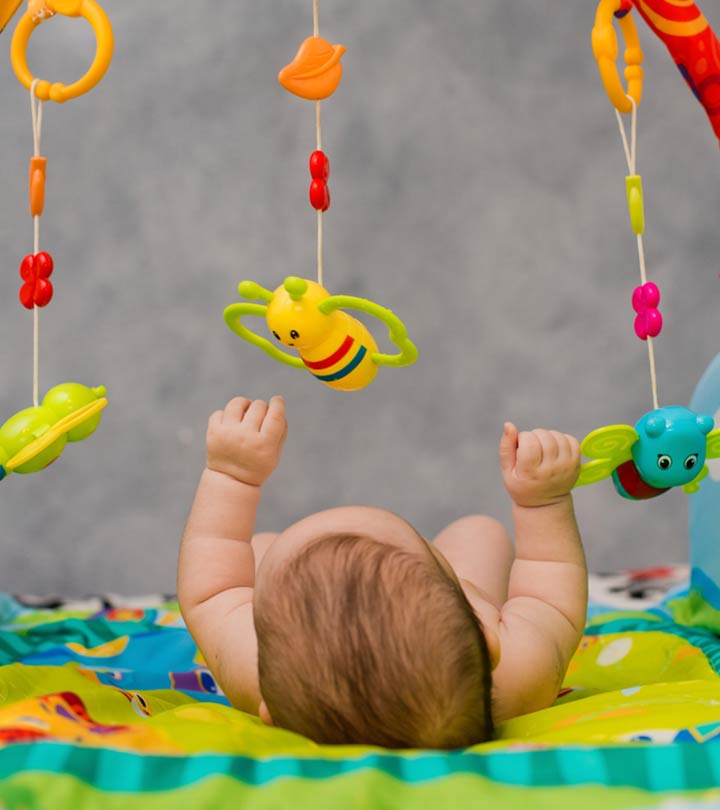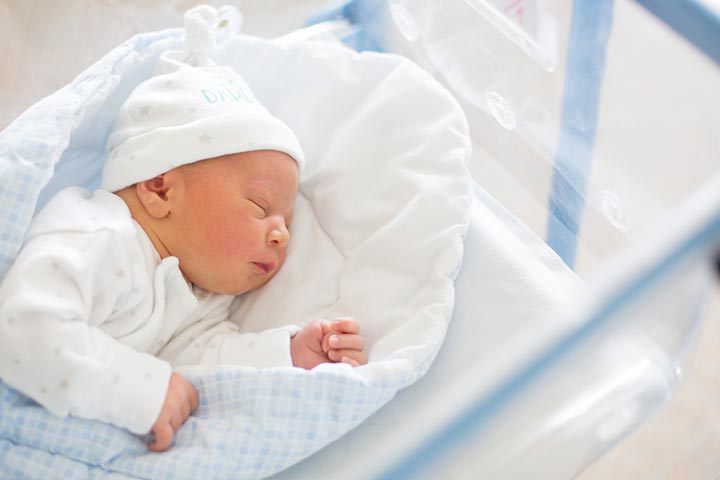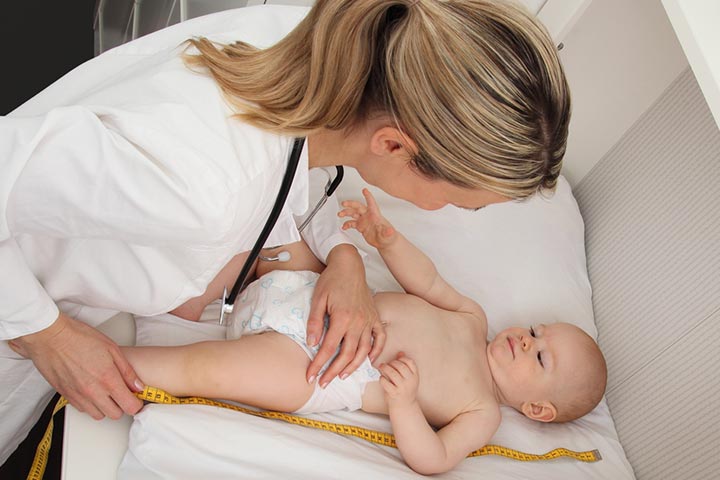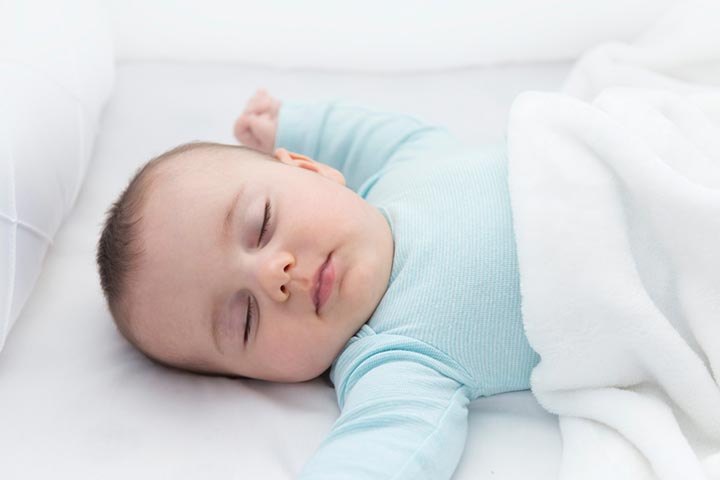How long can a baby sleep in a pack ‘n play while meeting all the suggested safety precautions? This question is sure to emerge in the minds of many parents.
A pack ‘n play is a play yard with bumper pads that can be conveniently folded and packed. Its compact size makes it easy for parents to carry it while moving or during short- and long-travel. Furthermore, it is a multipurpose piece of furniture that can be used for solitary play, as a bassinet, or as a diaper changing station.
Read this post to learn about the safety tips to follow while your baby sleeps or plays in a pack ‘n play.
Is It Safe For A Newborn To Sleep In A Pack And Play?
Yes, it is safe for your newborn to sleep in a pack and play since they are made with adherence to safety guidelines set by the Consumer Product Safety Improvement Act of 2008 (CPSIA) (1). Several pack and plays even come with a provision to insert a mattress to make the sleep surface comfortable for the little one. This feature also makes it function as a portable bed or portable crib.
You must ensure you pick a pack and play that meets the CPSIA standards. You may check the manufacturer’s website or contact them directly if you do not find any disclosures on the product packaging. Parents must note that pack and plays are safe sleep surfaces only for children up to 35 inches tall or 30 pounds in weight (2)
Pack And Play Vs Crib
Babies sleep well and feel cozy in cribs or packs and plays. However, both can have different elements that make them set apart from each other. Below are some differences to look out for:
- Portability: A crib is a sturdy and not-easily-movable piece of furniture. Some have wheels, but they’re usually not great for moving around a lot. Pack and plays, on the other hand, can be folded easily and are usually light in weight. They can be easily moved around without much hassle.
- Size: Pack ‘n plays are smaller than regular cribs because they’re designed to be portable. While this is handy for travel, it also means the mattress is smaller, giving your baby less space to wiggle. On the flip side, a crib mattress is more spacious.
- Mattress: Crib mattresses are more like full-size, thicker, and more comfier mattresses that can also be used by an adult. A pack-and-play mattress, on the other hand, comes with less padding, making it uncomfortable for your little one to get a sound sleep.
- Versatility: A crib is generally used for sleeping purposes, whereas a pack-and-play is multifunctional. In addition to letting your baby take a short nap in a pack-and-play, you can also set it up in your living room and go ahead with your daily work as usual.
- Price: Cribs often cost more than pack ‘n plays since they’re usually made of wood and are heavier.
- Longevity of use: Both a crib and a pack-and-play can be used till toddlerhood. However, as your baby grows, a pack-and-play may not be comfortable and could be too small for everyday sleeping. In that case, you can use a pack and play till your baby is a newborn and transition to a crib when you are ready.
Which Pack And Play Attachments Are Safe For Infant Sleep?
Most pack and plays come with attachments such as a changing station, a detachable bassinet, and a play area at the bottom. The bottom play area can be used for putting your baby to sleep at bedtime. You may purchase a suitable mattress that snugly fits into the play area. Choose a mattress recommended or sold by the manufacturer of the pack and play.
Some pack and plays come with full-sized bassinets, which fit on top of the pack and play’s frame. These come with integrated padding to make it comfortable for the baby during naptime. However, do not place the baby in the full-sized bassinet once they begin to roll. Place them in the bottom play area since it is safer due to the tall mesh walls, which prevent the baby from rolling out. Never place a baby to sleep on the changing station or in a half-sized/compact bassinet.
When Should A Baby Stop Sleeping In A Pack And Play?
Safety guidelines suggest that you stop placing your baby for sleep in a pack and play once they are more than 35 inches in height or weigh more than 30 pounds, whichever earlier, since each baby has a different growth rate (2). These guidelines apply regardless of your baby’s age and gender.
How To Make Pack And Play A Safe Sleep Environment?
You can ensure your baby’s safety in a pack and play by keeping the following safe sleep guidelines in mind (3).
-
Always put your baby to sleep on his/her back as it is the safest position for them to rest and sleep.
-
Use a tight-fitting and firm mattress at the base or bottom play area of the pack and play. It ensures there are no loose gaps between the mattress and the mesh walls.
-
Place the pack and play in your room. According to the American Academy of Pediatrics, room sharing could reduce the risk of sudden infant death syndrome (SIDS) by 50% (4). Room sharing also makes nighttime feeding and changing diapers easier.
-
Do not keep any loose bedding or pillows in or near the sleeping area with intentions to keep your baby warm, as it increases the risk of suffocation.
-
Ensure that the pack and play is properly set on a firm surface and the sides are locked tightly before putting your baby into it.
-
Do not add any extra bedding except the mattress provided or recommended by the manufacturer.
Investing in baby gear like pack and play may be beneficial because it can be used as a play area, diaper changing station, and bassinet. Before using it as a sleeping bed, you should be sure of how long your baby can sleep in Pack ‘N Play. Babies may generally sleep in it until they can transition to a toddler bed. That said, every baby has a different growth rate, so keep the size and weight of your baby into consideration. Remember to follow safety guidelines such as using a firm mattress and avoiding pillows while using pack and play as a sleeping area for your baby.
Key Pointers
- Pack ’N Play or pack and play is a type of play yard for babies to sleep and play.
- Pack ’N Plays conform to the US Consumer Product Safety Improvement Act and are safe for babies.
- Most of them come with a changing station, detachable bassinet, and play area. Ensure to choose a mattress that fits in the play area.
- You may stop placing your baby in a pack and play once they are 35 inches tall or more than 30 pounds.













